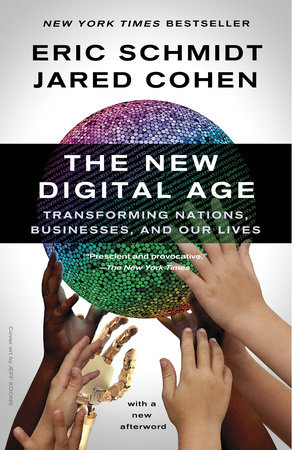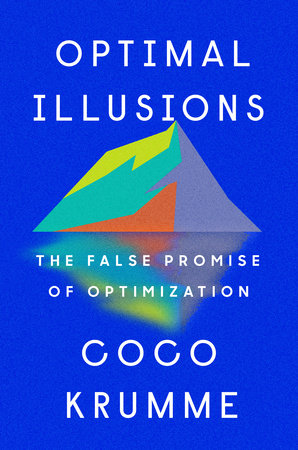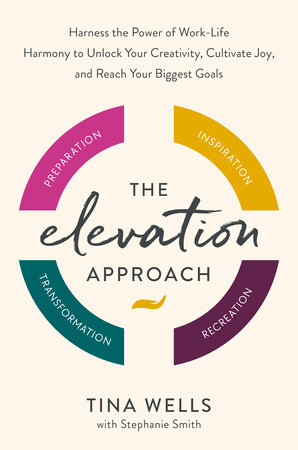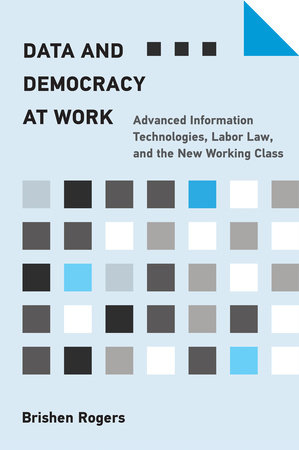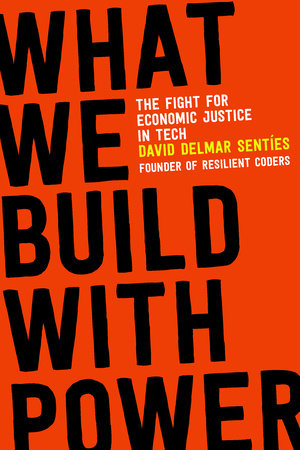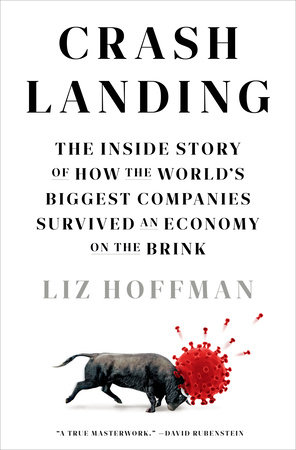Quick Summary
One Sentence Summary:
“The New Digital Age” by Eric Schmidt and Jared Cohen explores the transformative power of technology on global society, politics, and economics in the future.
Big Idea:
Technology will fundamentally reshape every aspect of our lives, from personal relationships to international diplomacy, creating both unprecedented opportunities and challenges.
Five Key Ideas:
- Digital Identity: The evolving nature of our digital selves and the impact on privacy and security.
- Global Connectivity: The spread of the internet will lead to greater global connectivity, influencing politics, activism, and societal change.
- Future of Nations: How technology affects statecraft, warfare, and the balance of power.
- Revolution in Business: The transformation of traditional industries and the rise of new economic paradigms.
- Ethical and Moral Questions: The complex ethical dilemmas posed by advancements in technology, including AI and automation.
Actionable Advice:
Embrace technology but be mindful of its implications. Stay informed and engaged in discussions about privacy, security, and the ethical use of technology.
About the Authors:
Eric Schmidt, former CEO of Google, and Jared Cohen, Director of Google Ideas, are tech visionaries with deep insights into how technology shapes our world.
Read Next:
- “Life 3.0” by Max Tegmark for a deep dive into AI’s future impact.
- “The Industries of the Future” by Alec Ross for insights into emerging industries.
- “The Age of Surveillance Capitalism” by Shoshana Zuboff for a critical look at data privacy and capitalism.
In Depth
Digital Identity
In “The New Digital Age,” Schmidt and Cohen delve into the complexities of digital identity, a key idea that resonates throughout the book. As we increasingly live our lives online, our digital identity becomes as crucial as our physical one.
Fragmentation of Self: The authors discuss how our online personas often differ from our real-life selves. They argue that the internet allows us to fragment our identity, presenting different versions of ourselves in different contexts. This can lead to a disconnection between our online and offline lives.
Privacy and Security: A significant part of the discussion revolves around privacy and security concerns. In an era where data is gold, protecting one’s digital identity is paramount. The authors caution that as technology advances, so do the means to exploit it. They emphasize the need for robust security measures to protect our digital selves.
Digital Footprint: Schmidt and Cohen highlight how our digital footprint is almost permanent. They point out that what we do online can have long-lasting effects, sometimes impacting our opportunities and reputation. The authors provide a detailed example of this, discussing the case of online shaming and how a single post or comment can lead to severe real-world consequences.
Control and Ownership: The book raises questions about who owns and controls our digital identity. The authors suggest that we often cede control to tech companies, which can lead to exploitation and manipulation. They urge readers to be more mindful of the information they share and the platforms they use.
Future Implications: Looking to the future, Schmidt and Cohen speculate about the evolution of digital identity. They foresee a world where our online and offline identities merge, creating both opportunities and challenges. The authors predict that managing our digital selves will become an essential life skill.
In discussing these aspects, Schmidt and Cohen provide an enlightening perspective on digital identity. They emphasize its importance in the following quote:
“In the future, our digital identities may become more important than our physical ones. They will be the keys to accessing services, communities, and opportunities.”
This quote encapsulates the essence of the digital identity discussion in the book. It highlights the growing significance of our online selves and the need to navigate this new terrain with care and understanding.
Global Connectivity
Global connectivity is a central theme in “The New Digital Age”. Schmidt and Cohen explore how the internet’s expansion connects people worldwide, reshaping societies and politics.
Access to Information: They emphasize the democratization of information. The internet breaks down barriers, granting remote areas access to knowledge once reserved for the privileged.
Impact on Activism: The authors discuss the internet’s role in activism. They provide a detailed example from the Arab Spring. Social media acted as a catalyst, helping organize protests and spread awareness globally. This example illustrates the power of connectivity in sparking societal change.
Digital Divide: Despite these benefits, a digital divide persists. Not everyone has equal access to the internet. Schmidt and Cohen stress that this divide creates inequalities, impacting education and economic opportunities.
Cultural Exchange: Global connectivity fosters cultural exchange. People from different backgrounds interact online, leading to a greater understanding and sometimes, clashes. The authors explore both the unifying and divisive effects of this exchange.
Economic Impact: The book also delves into the economic impacts of global connectivity. It opens up markets and creates opportunities for innovation and entrepreneurship, especially in developing countries.
In discussing global connectivity, Schmidt and Cohen provide a thought-provoking perspective. They encapsulate its transformative power in the following quote:
“The internet is the largest experiment involving anarchy in history. It represents the largest ungoverned space on planet Earth. Never before in history have so many people from so many places had so much power at their fingertips.”
This quote highlights the vast potential and challenges of global connectivity. It underscores the power shift the internet brings, empowering individuals and challenging traditional power structures.
Future of Nations
In “The New Digital Age”, Schmidt and Cohen dive into how technology will shape the future of nations, affecting everything from governance to warfare.
Technology in Statecraft: They discuss the growing role of technology in diplomacy and governance. Governments now use digital tools for everything from providing services to espionage.
Cyber Warfare: A significant portion of their discussion focuses on cyber warfare. They predict that future conflicts will increasingly involve cyber attacks. One example given is the Stuxnet virus, which targeted Iran’s nuclear program. This incident highlights the potential of cyber warfare to impact physical infrastructure and global politics.
Balance of Power: The authors explore how technology alters the global balance of power. Smaller nations can now wield significant influence through technological prowess. This shift challenges traditional notions of power based on size and military strength.
Citizen Empowerment: Technology also empowers citizens. People can now hold their governments accountable in ways previously unimaginable. Social media, for instance, enables rapid mobilization and information dissemination.
Economic Implications: The book delves into the economic implications of technological advancements. Nations that embrace innovation can leapfrog in development, while those that resist may fall behind.
In discussing the future of nations, Schmidt and Cohen provide a comprehensive view. They summarize the transformative power of technology in the following quote:
“The internet is the first thing that humanity has built that humanity doesn’t understand. It is the largest experiment in anarchy that we have ever had.”
This quote underscores the unpredictability and vast potential of technology to reshape nations. It emphasizes the need for understanding and adaptation in this rapidly evolving landscape.
Revolution in Business
Schmidt and Cohen delve into how technology revolutionizes business in “The New Digital Age.” They discuss its profound impact on industries, economies, and the way we work.
Disruption of Traditional Industries: The authors highlight how technology disrupts traditional industries. Retail, for example, has been transformed by e-commerce. Companies like Amazon changed how we shop, making it possible to buy almost anything online.
Rise of the Gig Economy: They discuss the rise of the gig economy. Platforms like Uber and Airbnb allow people to earn money in new ways. This shift offers flexibility but also raises questions about job security and workers’ rights.
Global Competition: Technology levels the playing field in business. Small startups can now compete globally, challenging established corporations. This shift fosters innovation but also increases competition.
Changing Work Dynamics: The book explores how technology changes the workplace. Remote work, once a rarity, is becoming the norm. This change offers freedom but also blurs the lines between work and personal life.
Ethical Considerations: Schmidt and Cohen address the ethical implications of business technologies. They caution against using technology to exploit workers or invade privacy.
In discussing the revolution in business, Schmidt and Cohen provide a clear view of its scope. They encapsulate the essence of this transformation in the following quote:
“The future of business is in being able to predict what consumers want before they know they want it, and delivering it seamlessly.”
This quote highlights the power of technology in understanding and shaping consumer behavior. It emphasizes the need for businesses to adapt to this new reality to thrive.
Ethical and Moral Questions
In “The New Digital Age”, Schmidt and Cohen grapple with the complex ethical and moral questions arising from technological advancements.
Privacy vs. Security: One of the most pressing issues they discuss is the balance between privacy and security. The authors highlight the tension between the need for government surveillance to ensure security and the individual’s right to privacy. They provide the example of the NSA’s surveillance programs, which sparked global debate on this issue.
AI and Automation: They delve into the ethical implications of artificial intelligence and automation. While these technologies promise efficiency and advancement, they also pose risks, such as job displacement and ethical dilemmas in decision-making processes.
Data Ownership: The question of who owns and controls personal data is another critical issue. Schmidt and Cohen argue for the need to establish clear norms and regulations around data ownership to protect individuals from exploitation.
Digital Divide: The ethical considerations of the digital divide are also discussed. The authors express concern that unequal access to technology could exacerbate social and economic inequalities.
Technology and Warfare: Ethical questions surrounding the use of technology in warfare are examined. The use of drones, for instance, raises moral dilemmas about remote warfare and civilian casualties.
In addressing these ethical and moral questions, Schmidt and Cohen provide a thoughtful perspective. They summarize the complexities in the following quote:
“Technology is neutral, but people are not. The same technology can be used to save lives and to end them.”
This quote captures the essence of the ethical challenges presented in the book. It underscores the need for thoughtful and responsible use of technology, considering its profound impact on society.
Actionable Advice
-
Embrace Technology Wisely: Adopt new technologies, but understand their implications for privacy, security, and society.
-
Stay Informed: Regularly update yourself on technological advancements and their potential impacts.
-
Prioritize Security: Protect your digital identity by using strong passwords and being cautious about the information you share online.
-
Engage in Dialogue: Participate in discussions about the ethical use of technology, privacy rights, and data ownership.
-
Support Equal Access: Advocate for initiatives that bridge the digital divide and ensure equitable access to technology.
-
Foster Adaptability: Cultivate a mindset of adaptability to navigate the rapidly changing technological landscape, especially in the workplace.
-
Promote Ethical Practices: Encourage and support businesses and platforms that prioritize ethical practices and user privacy.
-
Be a Responsible Citizen: Use technology responsibly, understanding its power to influence and shape societal norms and values.
About the Author
Eric Schmidt is an influential tech leader and innovator. He served as Google’s CEO from 2001 to 2011, guiding it through monumental growth and transforming it into a tech giant. Born on April 27, 1955, in Washington, D.C., he pursued electrical engineering at Princeton University and later earned a Ph.D. in computer science from UC Berkeley. His career spans various tech firms, including Bell Labs, Zilog, and Sun Microsystems. At Google, he played a pivotal role in the company’s expansion and innovation, later serving as its Executive Chairman. His beliefs center around the power of technology to drive progress and address global challenges. Jared Cohen, born on November 24, 1981, in Connecticut, is a renowned author and tech advisor. A Stanford University and Oxford graduate, he served as a member of the Secretary of State’s Policy Planning Staff under both Condoleezza Rice and Hillary Clinton. He later joined Google, where he founded and led Google Ideas, now known as Jigsaw. Cohen’s work focuses on how technology impacts foreign affairs and his beliefs emphasize the intersection of technology and geopolitics.
Read These Next
You might like these similar books
- “The Industries of the Future” by Alec Ross
- “The Fourth Industrial Revolution” by Klaus Schwab
- “The Net Delusion: The Dark Side of Internet Freedom” by Evgeny Morozov
- “The Age of Surveillance Capitalism” by Shoshana Zuboff
- “Thank You for Being Late: An Optimist’s Guide to Thriving in the Age of Accelerations” by Thomas L. Friedman
FAQ
Q: What is ‘The New Digital Age’ about?
A: It explores how technology shapes our future, impacting everything from politics to personal lives.
Q: Who authored the book?
A: Eric Schmidt and Jared Cohen.
Q: Is the book technical?
A: No, it’s written for a general audience, focusing on broader implications of technology.
Q: Does it discuss the impact of social media?
A: Yes, it covers how social media affects activism, politics, and personal connections.
Q: Are there any predictions about the future?
A: Yes, it includes predictions about global connectivity, business, and governance.
Q: Is the book suitable for business professionals?
A: Absolutely, it offers valuable insights into how technology is reshaping the business world.
Q: Does it address privacy concerns?
A: Yes, it delves into the ethical challenges, including privacy in the digital age.
Q: Is there any advice for readers?
A: The book provides actionable advice on adapting to and understanding the digital age.

